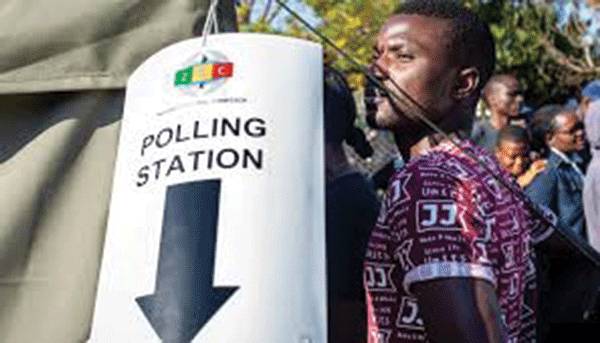
By Margaret Chinowaita I HAVE participated in the Zimbabwean elections as a voter from the year 2000. I was not eligible to vote earlier because of my age, but I witnessed elections in the 1990s as a student. Voter apathy was mainly recorded as citizens shunned elections because the country was a de facto one-party State.
Opposition political parties such as Zimbabwe Unity Movement (Zum) headed by the late Edgar Tekere a former Zanu PF cadre in the 1990 made a mark with the youth but did not go far in shaking the ruling Zanu PF. Opposition parties came and went, but none posed any serious threat. Come 1999, the Movement for Democratic Change was formed under the formidable leadership of Morgan Tsvangirai. Zimbabweans participated in elections in their numbers in the year 2002.
I participated hoping for change. I have been participating in elections since then, with the same results, the ruling party winning. The story of Zimbabwe elections under the late President Robert Mugabe and the first republic is known. Voters were intimidated, food was used as a weapon to manipulate voters in the rural areas, and violence was employed to control the voter. It was incalcated in voters that no other party will ever win elections in Zimbabwe expect Zanu PF.
The ruling party had the State apparatus at its disposal in the form of media, police, intelligence and the whole system of government. It was difficult to differentiate between the State and the ruling party. We are in the second republic led by President Emmerson Mnangagwa. This republic brought temporary joy for many Zimbabweans. Most celebrated when Mugabe was deposed, paving way for the new regime. The new dispensation came with many promises, including that of holding free and fair elections.
The year 2018 was a test case for the new dispensation, but I felt robbed because the results seemed skewed in favour of the ruling party that enjoyed the support of the Zimbabwe Electoral Commission. I don’t want to delve into the negative side of Zimbabwe’s elections but just to mention that elections cost money, and it seems the ruling party dips into State coffers while the opposition is left to rely on its shallow pockets. We can argue that the opposition should be wiser, fundraise more to finance elections.
I am bothered by the statement that is usually repeated that the opposition will never win elections in Zimbabwe. This has been repeated so many times that the ordinary people buy it, defeating democracy.
I worry because the late Tsvangirai had many supporters, filling his rally venues to the brim, but never won an election. Zanu PF would have big rallies in rural areas, and win elections. I want to argue that with the vast State machinery at its disposal, Zanu PF is able to preach its gospel effectively to all corners of the country. Maybe the ruling party’s ability to reach the rural areas remain its mainstay. So instead of the opposition labelling the ruling party officials election thieves, it should take stock and strategise fast for the 2023 elections.
The weekend by-elections served as a dry run for the actual elections. Nelson Chamisa of CCC moved around the country on a campaign trail, commanding numbers. The opposition should take stock after the March 26 elections to ascertain whether the myth that no party will win in Zimbabwean elections except the ruling party holds — a dangerous assertion that can be ignored at the opposition party’s peril.
- Chamisa under fire over US$120K donation
- Mavhunga puts DeMbare into Chibuku quarterfinals
- Pension funds bet on Cabora Bassa oilfields
- Councils defy govt fire tender directive
Keep Reading
Chamisa spoke passionately about how Zimbabwe belongs to everyone, how anyone can rule it and bring development. The politics of Zimbabwe need numbers and clear-cut strategies to make it.
Zanu PF cannot just be dismissed, given the election history in Zimbabwe. The ruling party has over 40 years in the game, it has tried everything from robust media campaigns, use of intimidation and abuse of State apparatus.Indeed Chamisa’s CCC is very young, but it can learn from Zimbabwe’s election history and that of neighbouring countries such as Zambia.
The young leader needs to build structures that cascade down to ward level and make sure that the nation’s mindset changes and understand that anyone with ideas and strategies can rule Zimbabwe. Zimbabwe is for everyone.
- Margaret Chinowaita is a Zimbabwean journalist and guest blogger at Africa Blogging












